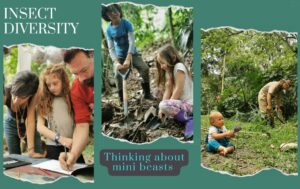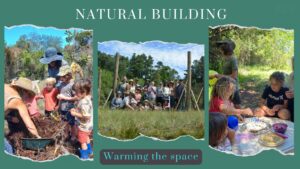This month’s Sprouts project opened the space to the wider Community of Practice and held a Regenerative Educators Cross Pollination session, a kind of reunion with our previous collaborators, with a vision to create more future collaborations.
The updates from across the globe were incredibly inspiring. We learned from our partners that:
In Colombia, the Minga work for food sovereignty continues. (A Minga is system of reciprocity where people come together to work towards a beneficial goal.) The programme is framed around the 4 elements: Earth – seeds, nest building, composting and planting; Water – rainwater usage, water filters. Air – welcoming pollinators; and Fire – igniting the flame of the community, bringing joy and transformation.


In Montenegro, they continue to welcome Ukrainian, Russian, and Serbian guests and are planning an ecological festival with the city to showcase waste management practices includuing a newly created vermiculture system.
In the Philipines, the Montessori school is focusing on inclusion and social aspects while the children enjoy harvesting their snacks from the local garden.
In Malawi, the Greening School approach continues to reach wider audiences. They are piloting an agroecology project where communities work better with their watersheds.
In Mexico, they welcome a strong transitional phase towards an understanding of what it means to be a “learning community” as they navigate the official frameworks from the government’s definition of a school.
In Iceland, Teacher Training is receiving a great deal of interest, as well as a surge of Youth Camps. Our partner from Regenerative Education and Adventures for Kids will co-represent us at COP28, along with our partner from Johannes Kepler School in Ecuador.
In Virginia, USA, the 11 acre school grounds welcomes the re-introduction of native plants which also serve as forage for the native pollinators. Students connect with the history of the land and understand the social impact it’s had over the years.

In South Africa, all hands are on deck in the Self Directed Learning Center, to give shape the the natural building outdoor kitchen which will host community events and welcome neighbours.
In CASA Latina, the education circle hosted an event about the impact of ecovillages, comparing global north and south, lead by an international researcher from the network.


And all of that is only a piece of what is happening on the ground. When the Community of Practice comes together, it can be enhanced and expanded! We also explored two big topics as educators and facilitators of learning communities… ecological accounting and capacity building.
While there is significant alignment on teaching regenerative *principles,* we noticed some space to more clearly define how we can demonstrate commitment to ensuring regenerative *practices* throughout the schools. We want to understand the impact of everything we do, from waste to food to school materials and general carbon use. Some call this environmental or ecological accounting. It can also be known as full-cost or true-cost accounting (where we also seek to understand the indirect costs of our resource use). We found strong resonance with how UNESCO outlines Greening Schools. More to come.
We also delved deeper into the question of how we can resource and build capacity for our adult teams (teachers, facilitators, guides, parents). We see the need within our group and our extended circles and discussed how these could be met in collaboration with this group. Excitingly, we imagined how we could bring our practitioner training to new audiences. This 12 module programme covers topics from inner regeneration as a self-awareness tool for educators, to community building and artful participation in learning environments, as well as integral school design, learning by doing, and collaborative projects. We are keen to find fellow educators and/or school communities who would like to join our pilot offering(s). If you feel like that could be you, let us know here.

Leave a Reply